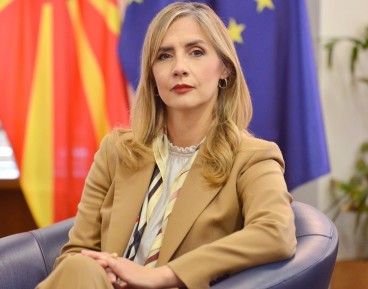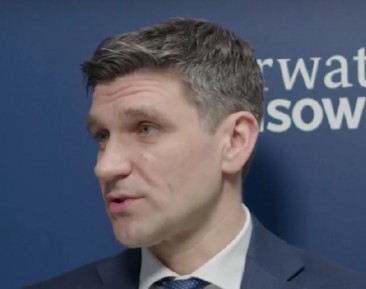Our monetary strategy has served us well for many years, providing anchor to the overall macroeconomic stability
Category: Macroeconomics
Grzegorz Jeż, Obserwator Finansowy: As far as Romania is concerned, do you still plan to access the euro zone?
Cristian Popa, Member of the Board of Directors, National Bank of Romania: To answer your question, I would say that we, as Romanians, we think that we have a different path than the Polish people, in terms of euro accession. We are more optimistic, let’s say, regarding euro accession. At the same time, we know that accessing the euro zone is not a panacea. We know that it will not fix the Romanian economy’s issues, if we don’t fix them. We know that the process is complicated. We know that the euro zone has things to solve, also, to evolve, like the fiscal union, fiscal consolidation, like the capital markets union. But our optimism must be realistic, let’s say. We still believe that accessing the euro zone would be a good step for Romania. We are fully committed to accessing the euro. This is not only that we, as a central bank, are communicating, but this is also what the average Romanian in the street would tell you. But at the same time we know that we have to tick the boxes, we have to qualify, to realize the accession criteria. And that is a longer process. That is a more complicated process. We know that if a country is bigger, then it has a more complicated process for accession to the EU. Why is that? For example, Bucharest. The average GDP in PPP in Bucharest is above the European average. But if you look at other regions, at discrepancies between the capital city and other cities, then the differences can be meaningful. And it’s difficult. We have to take this into account. The Governor actually had a public position on this. And he said it like this. If you take out the founding fathers of the euro zone, then only small countries joined afterwards. So there is no kind of a precedent to have a big country joining. And, actually, he’s said it like this: if you cut the Bucharest metropolitan zone – you have around 4 million people – that is easy to access. But what do you do with the rest of the country?
Yes, I see. In fact, you should take into account the consequences for the whole country. But in general, what would your expectations be from this potential changeover to the euro? So, why join the euro zone, from your perspective?
Well, first of all, fair trade, more smooth trade. You basically take the FX risk out of any commercial trade. This is one aspect. The other aspect is about financing costs. We think that we could obtain lower financing costs, if we used the euro. We know it’s not a perfect solution. We know there are trade-offs in this. We know that monetary policy decisions will not be made only by one board, by the National Bank of Romania’s board, but by the board of governors all across Europe. We know this, but we think that the trade-off is worth it. We think that it’s a good trajectory for us to have this future path.
Do you think that the process of enlargement of the euro zone is still an ongoing process? That it will, let’s say, absorb more and more countries?
Well, looking at recent history, I would say ‘yes’. We have Croatia, just joining in. We have our neighbours, Bulgaria, looking to join soon, being in the process, in the ERM2 process. So it seems like it’s a living organism. And it evolves, so we are constructive on this.
Let’s switch for a while to another subject. There is still an ongoing war between Russia and Ukraine. Almost one year already. There are still different scenarios for the conclusion of the war. What do you think may happen, if the war stretches out to the next years? And what does it mean for Europe, for people, for the economy? Can we predict something? I know it’s tricky, but can we have an assumption what may happen?
I try to be optimistic on the subject. And put it the other way. If the conflict will stop early, if we have peace early, I think we would basically eliminate one big supply-side factor that affects ,all over the world, prices, energy prices. So, I think we would be in a better position, not only us, as Romania, but us as central bankers, us as economies in Europe and, basically, all around the world. Why am I saying this? Because the major cost – I mean excluding the human trauma and the human cost – If we are talking about the economic cost, then all this supply side-driven inflation shock is connected to energy prices. The energy price shock is connected to the war. So, if the war ended soon, then I think we would have lower energy prices. We, basically, would – like the pandemic, we don’t talk about the pandemic anymore – we would probably have some scars, but we would move on. We would, basically, have one issue less on the agenda. And that would be lower energy prices, a more disinflationary environment. So this would be the plus. When will it end? It’s hard for me to say. For sure, as a human, as an economist, I would like to see a really fast end, a fast move to peace. But, unfortunately, it is not up to me to influence the conflict. For sure, energy prices are a big issue.
Do you think that energy prices, and the energy crisis in general, is the biggest problem we face today, from an economic perspective?
Well, they are connected. It’s usually a mix. And they usually add up in a negative sense. So we have energy prices. From energy prices we have lower economic growth in Europe. Europe is really close to recession levels, so through this, I mean, Romania, like Poland, is a big commercial partner with Europe. So we are feeling the pain, via commercial relations with Europe, due to energy prices. It’s not only energy prices, that’s for sure. We had supply chain issues. We had the scars of the pandemic. They are all adding up and create this inflationary environment for which, unfortunately, central banks do not have a perfect solution. I was saying about supply-side inflation. Unfortunately, we at central banks have instruments that influence mainly the demand-side, not the supply-side. And the supply-side is the one that is causing inflation. Mervyn King, the ex-Governor of the Bank of England, has this very simple way of describing the situation. ‘What is inflation? Too much money chasing too few goods.’ The problem now is that there are too few goods. We as central banks cannot produce gas, cannot produce oil. We can only influence the demand side. It would be much easier for the supply-side factors to come back.
We may say that today central banks are in the limelight, but in fact can we say that they are not the main protagonist to be addressed with the problem? It’s beyond financial policy, to a very big extent.
To a very big extent. I think that is the right wording because at the same time we cannot just say we cannot do anything. Because if we do not act, and we have acted for more than one year already, if we do not act, then people will not trust us. Then we will lose credibility. Then inflationary expectations will increase and then we would have an even bigger shock. And then we would have to have even stronger increases in interest rates. But what we have done in Romania, and it’s all over the region, I think we managed to do this balancing act. To have gradual moves, in the right way, to act, but acknowledge that it is a supply-side-driven inflationary shock; so acting and having this in mind, so not bruising the economy, not scaring too much investors, but doing something that we have to do. In line with our price stability mandate, our inflation target is 2.5 per cent. Inflation is much higher now. So we had 11 consecutive meetings of the central bank board, for increasing interest rates. After 11 meetings, we had one meeting where we said, “it’s enough, at least for now. Let’s stop and re-analyse. We are seeing much better inflation figures.”” We have just published our new inflation forecast. We see inflation coming down, quite aggressively, I would say. I like to say that it has come as it goes, fast and from exogenous factors.
The interview was held on the 20th of February 2023.


